Here’s Why Natural Deodorants Might Work For You, According to 5 Dermatologists

If you purchase an independently reviewed product or service through a link on our website, SPY.com may receive an affiliate commission.
Sometimes, it feels great to go au naturale. There are plentiful ways to go “natural” in the products you buy these days, as the term “all natural” has thoroughly proliferated the health and wellness space with a seemingly unregulated ferocity. All-natural grooming has skyrocketed in popularity, with product categories like natural soap, natural cologne and clean face washes filling up the shelves from brands that promise “clean ingredients” and “everything you need, and nothing you don’t.” What does it mean for a product to be “natural?” How important is it to choose a “natural” product? Do “natural” products even work?
Today's Top Deals
These Amazon Security Cameras Are Going for Less Than $20 Each Right Now
Over 34,000 Users Gave These Fat Burner Supplements 5 Stars on Amazon
Yes, It’s Possible To Get AirPods for Less Than $100 — But Hurry, This Deal Won't Last Long
One natural product that has peaked our interest is natural deodorant. Natural face wash? Sure. Natural toothpaste? Maybe. But you’re telling me a mix of coconut oil and essential scents is going to keep my sweat stink away mid-presentation? I’m skeptical. Common fears around aluminum penetrating armpit pores and causing all sorts of cancers, illness and diseases has spurred a plethora of natural deodorant brands touting cleaner ingredients, eco-friendly packaging and a sweat-free lifestyle without the beauty-induced malignants. But, do they work? Do they contain the sweat-busting, odor-disguising ingredients you need to stay dry, comfortable and inviting to people who get within three feet? We decided to skip the anecdotal evidence and consult some experts.
We interviewed five dermatologists with decades of experience about the what, when and why of natural deodorant. What differentiates a natural deodorant from an antiperspirant? When does natural deodorant actually work, if ever? Why should an interested consumer make the switch? We got some great advice, and some recommendations for brands to try, if you’re looking to go the all-natural route.
Natural Deodorants vs. Antiperspirants
First off, it’s important to clarify that deodorants and antiperspirants are different things, despite the terms sometimes being used interchangeably.
Dr. Michele Green, Cosmetic Dermatologist explained that “Antiperspirants and deodorants are both effective methods for treating sweat, though the goal of each product is somewhat different.”
“Using an antiperspirant will reduce the overall amount of sweat produced and released and can help minimize odor. A deodorant will improve the smell of the sweat by targeting odor, acidity, and bacteria, but won’t impact how much sweat is produced.”
She explained that the “Antiperspirants’ main job is to help control sweat by preventing sweating itself. This happens typically by blocking sweat glands. The active ingredient in antiperspirants is aluminum. Aluminum works by reducing the amount of sweat we exert.”
Are Natural Deodorants Safer to Use?
Aluminum blocking sweat glands? That sounds kind of invasive, no? We also asked our panel of experts whether aluminum was a cause for concern in terms of being an active ingredient in a grooming product we use every day.
Elle MacLeman, Skincare Biochemist for The Derm Review with over 10 years of experience in the skincare and beauty industry, explained that “There’s been lots of hype about the effectiveness of natural deodorants. Some experts have claimed that these deodorants are safer than the widely advertised antiperspirants because they don’t contain aluminum which has been associated with increased risks of cancer. However, reputable scientists, and the National Cancer Institute, have revealed that there’s a lack of evidence to support such claims.”
NYC Dermatologist Dr. Hadley King confirmed this refutation, noting that “Aluminum has been linked to Alzheimer’s disease and to breast cancer, but whether or not the aluminum in antiperspirants contributes to these conditions is not yet definitively known, and there is no research data showing this.”
“The American Cancer Society states: ‘There are no strong epidemiologic studies in the medical literature that link breast cancer risk and antiperspirant use, and very little scientific evidence to support this claim.”
Read More: Is Aluminum in Deodorant Really That Bad For You?

What Are Natural Deodorants Made Of?
So, if these deodorants don’t contain aluminum, seemingly a very important, active ingredient in antiperspirants, what do they contain? Thankfully, some of them do contain natural moisture absorbers, antimicrobial ingredients and pleasing scents to keep you feeling fresh.
Dr. Paul Jarrod Frank, Celebrity Cosmetic Dermatologist in NYC, Author of The Pro-Aging Playbook and Creator of The Pro-Aging Podcast, explained that there are a few key ingredients in natural deodorant formulas that have been shown to help reduce sweat and odor.
He advices that “If you’re looking for a natural deodorant, look for one that contains either tea-tree oil or coconut oil as it has some antibacterial properties that can help with odor. In terms of sweat, opt for one with baking soda, cornstarch or arrowroot. They are pretty good at absorbing moisture.”
MacLeman clarified that for the most part, natural deodorants work by “containing antibacterial ingredients such as oils, tea tree, lavender, and eucalyptus. Many also include bicarbonate soda as a mild antiperspirant.”
“Keep in mind that there are some studies that suggest that using antibacterial products, conventional or natural, can disrupt the skin’s microbiome or balance of good bacteria.”
Dr. King also mentioned the potential for irritation, especially in natural deodorants that rely on baking soda for moisture regulation. “Many natural deodorants rely on baking soda to absorb moisture and neutralize odor, but too much baking soda can cause skin irritation in some people. Arrowroot powder is another moisture-absorbing ingredient found in some natural deodorants. None of these ingredients blocks eccrine ducts, they work rather by absorbing moisture. The efficacy will vary from person to person.”
What to Consider Before Trying Natural Deodorant
It’s also important to point out that there’s very little regulation at a federal level when it comes to the term “natural,” and the ingredients that can constitute a “natural” grooming product can vary wildly. Dr. Beth Goldstein, a dermatologist from North Carolina with 21 years of experience, and co-founder of men’s skincare brand Get Mr., explained that “there aren’t really any standards for what’s considered “natural”, and it’s not that these natural ingredients are any safer or less effective than synthetic ingredients.”
“Table salt is considered a natural ingredient – but it comes from mining/drilling just like talc, aluminum, and even crude oil do. Ultimately, if a deodorant or antiperspirant works for you and doesn’t irritate you, I think it’s a good product. But I wouldn’t pay much attention to “natural” labels – they’re mostly slapped on by advertisers trying to profit from the fact that true nuances in ingredient safety are complex and difficult to communicate.”
Dr. Frank advised new natural deodorant users to exercise patience when waiting for definitive results, good or bad. “The most important thing is to give it time. It doesn’t work well for everyone, but if you are serious about making the switch, allow yourself a few days or weeks to judge its efficacy. It takes time to rebalance your ecosystem.”
He went on to say that you shouldn’t “give up after trying just one brand, there are several options out there and depending on your concern, one might work better for you.”
MacLeman also mentioned a “detox period” where “you are likely to be smellier than usual for about a month before it ‘starts to work’. This, anecdotally, seems to hold legitimacy but it is hard to say whether you just get used to your new smell after a month or whether it does actually reduce.”
She went on to share that “The choice between conventional antiperspirants and natural deodorant should come down largely to personal preference and whether the product works for you. The environmental impact of the beauty industry is definitely a reason to get behind these brands that are doing their part.”
Dr. Green recommended the following natural products, if you’re interested in trying out new natural deodorant brands.
“I recommend Dove which is a traditional brand I recommend to my patients. It comes in both deodorant and antiperspirant formulas. In addition, Dermatologica and Tom’s natural deodorant are great choices for those who prefer the natural approach. If you feel you sweat a lot and need some extra protection, I recommend trying a prescription formula such as Drysol.”
Dove Men+Care 0% Deodorant Stick
This Dove 0% aluminum deodorant is more natural than its synthetic counterparts and has a non-irritating formula with plant-based moisturizers that help control odor and discomfort at the same time. It’s formulated for 48-hour odor protection, and has a refreshing eucalyptus and birch scent.
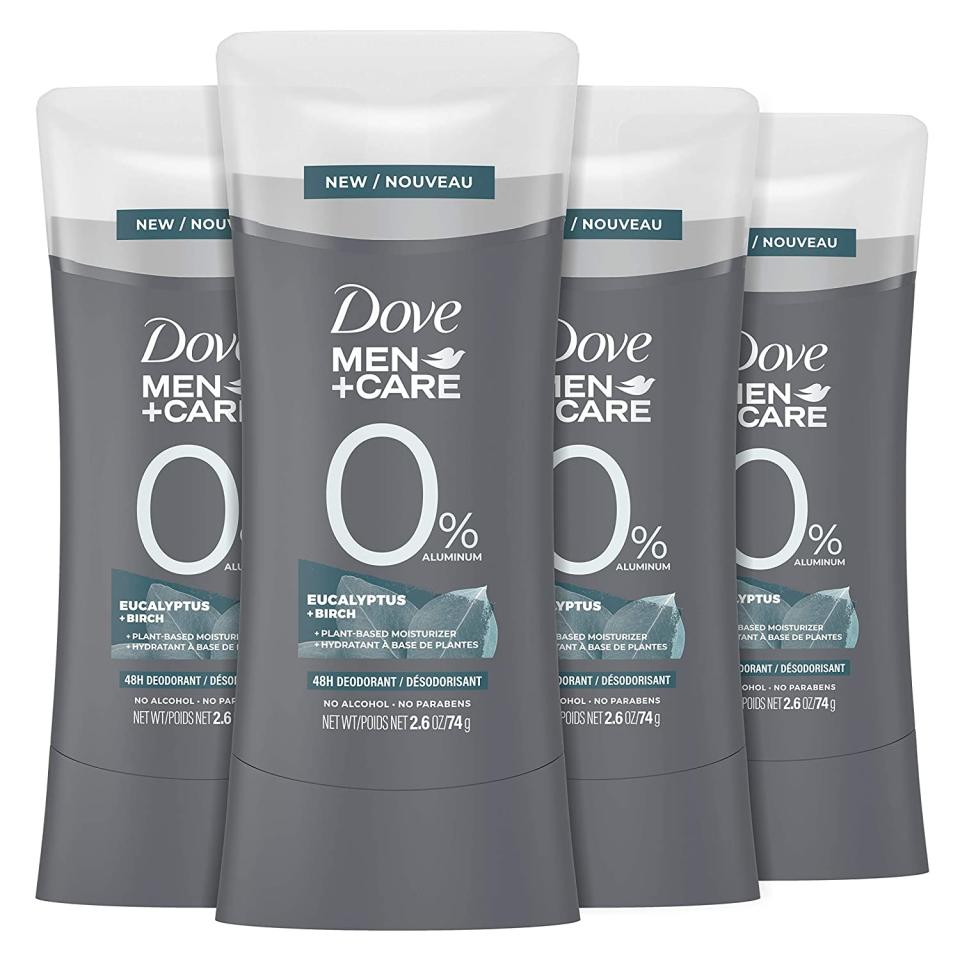
Buy: Dove Men+Care 0% Deodorant $27.52
Native Deodorant Coconut & Vanilla
Native is another well-known natural deodorant brand with excellent reviews on Amazon. Their formula is made without aluminum, parabens, phthalates and talc, and contains only naturally-derived ingredients. It’s designed for easy application and all-day odor protection with sustainably sourced ingredients.
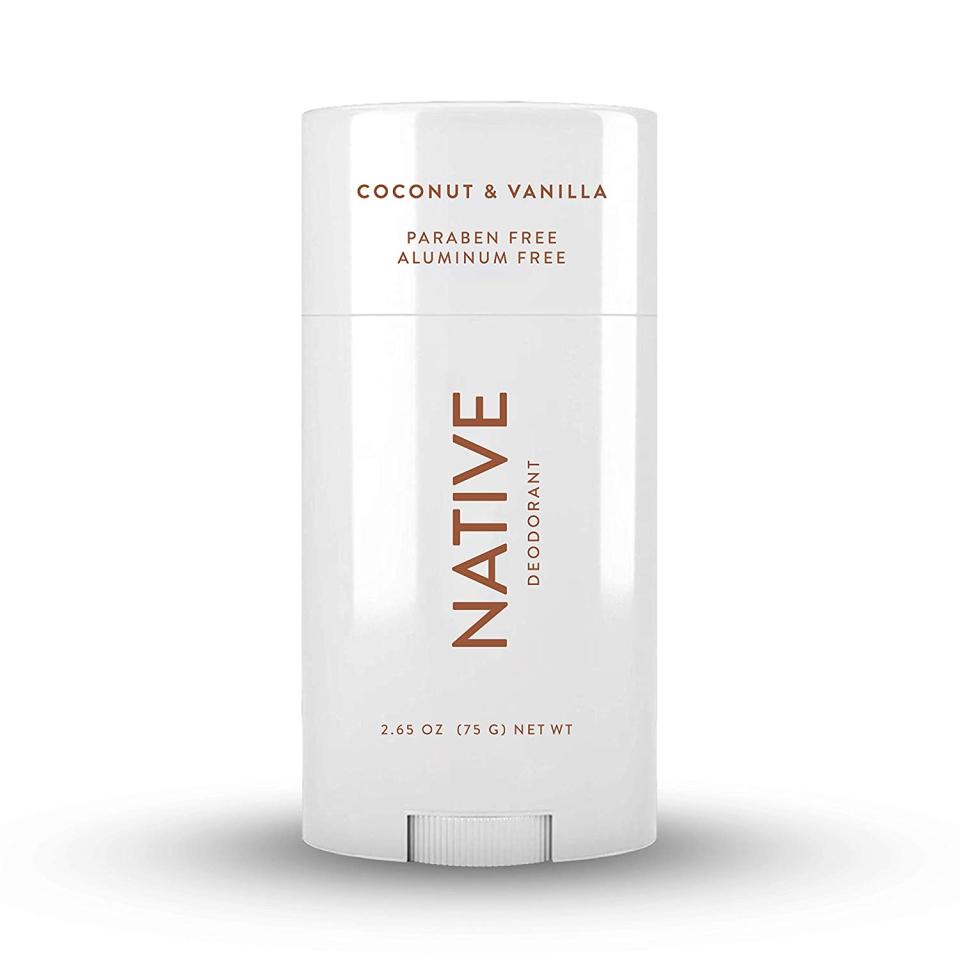
Buy: Native Natural Deodorant $12.97 (orig. $15.00) 14% OFF
Tom’s of Maine Natural Deodorant
This natural deodorant from Tom’s of Maine has 48-hour odor protection, an aluminum-free formula with naturally-derived ingredients and comes in 100% plastic-free packaging. It contains no artificial fragrances that irritate skin and this pack comes with three 2-ounce sticks that are great for air travel and portability.
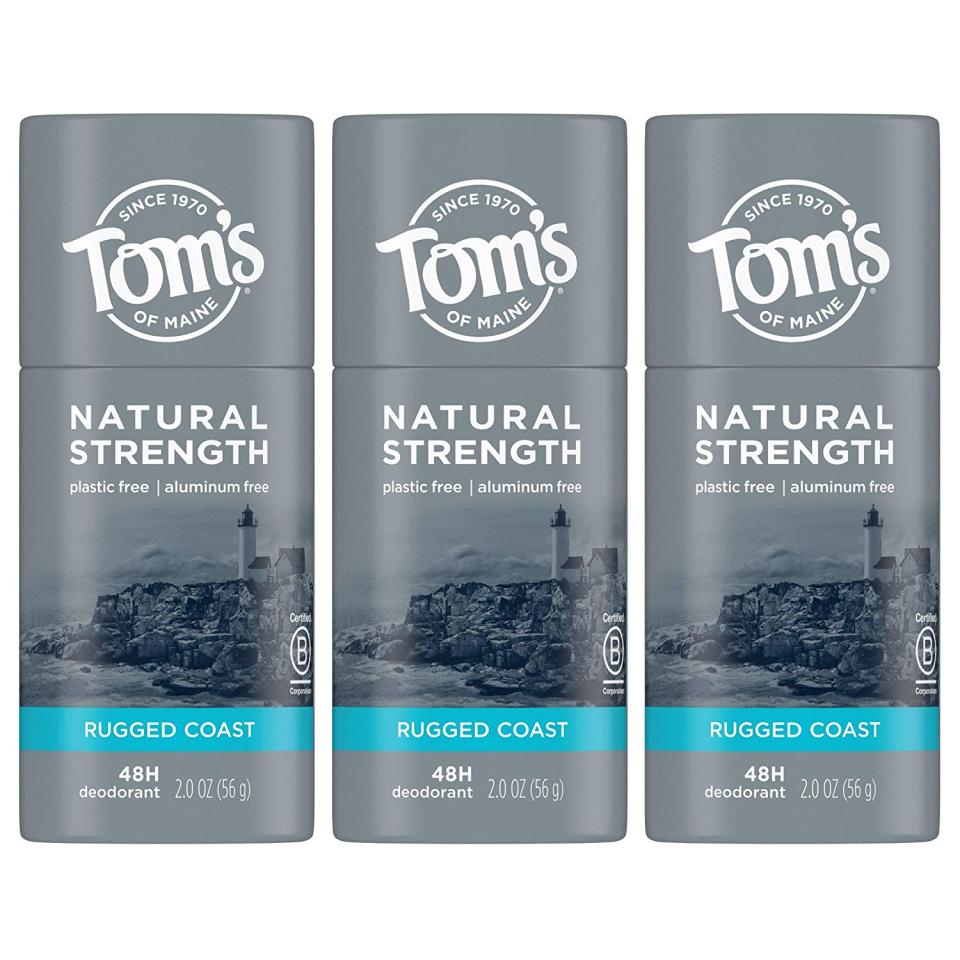
Buy: Tom’s of Maine Natural Deodorant for Men $13.17
Each & Every Natural Aluminum-Free Deodorant
This natural deodorant from Each & Every is made with only six clean ingredients and comes in sustainable, plant-based packaging that’s 100% renewable. It comes in a variety of scents, including coconut & lime, and weighs only 2.5 ounces so you can easily take it with you.
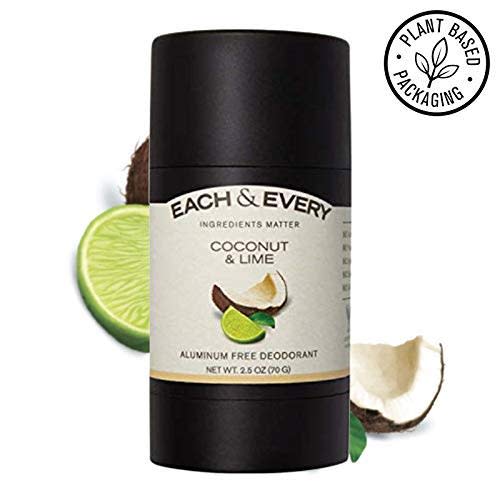
Buy: Each & Every Natural Aluminum-Free Deodorant $17.00
Dr. Squatch Natural Deodorant for Men
Dr. Squatch is a popular natural soap brand that avoids junky chemicals in its grooming products, and this aluminum-free deodorant 2-pack comes in Alpine Sage + Bay Rum scents. Both contain a formula with natural deodorizers like charcoal, probiotics to help prevent the growth of odor-causing bacteria, and the moisture absorber arrowroot. They glide on smooth and contain natural moisturizers like jojoba oil and shea butter.
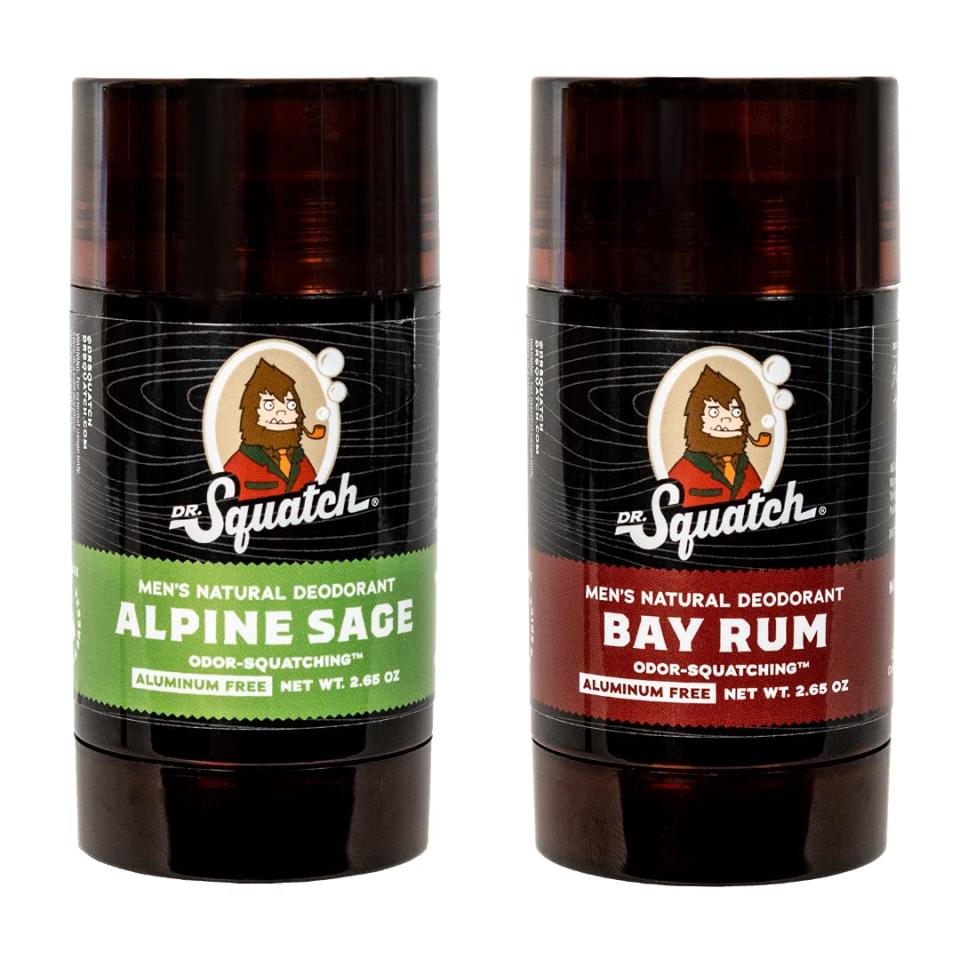
Buy: Dr. Squatch Natural Deodorant for Men $27.95 (orig. $36.00) 22% OFF
Editor’s Note: Some of the quotes in this article have been lightly edited for clarity and grammar.
More Top Deals from SPY
Best of SPY

